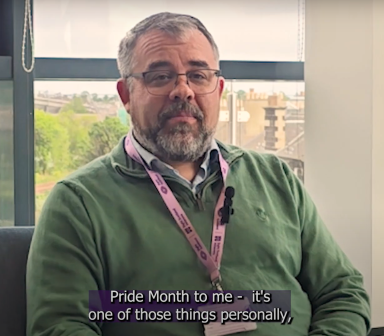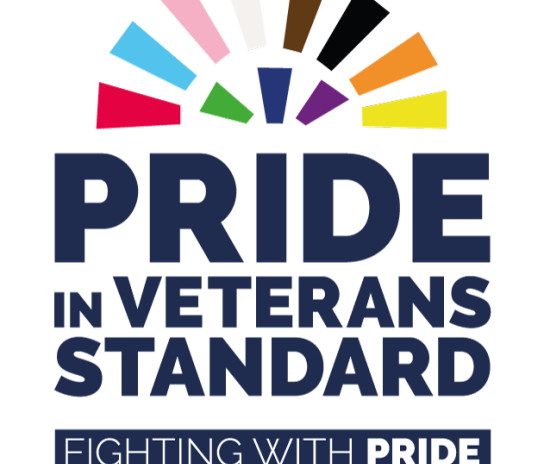Pride Month is a global celebration of the LGBTQ+ community, with events taking place throughout June around the world not only to celebrate this vibrant and inclusive community, but to raise awareness of the struggles and discrimination those who identify as LGBTQ+ face.
We sat down with Sight Scotland and Sight Scotland Veterans Chief Executive, Craig Spalding, to hear his thoughts on the importance of Pride and his experience chairing an LGBTQ+ forum for the Visionary Network, an umbrella body for local sight loss charities across the UK.

We're in this together. So I think it's really important for people who don't identify in that spectrum to be there in solidarity with their friends, their family, their co-workers. Not because it's the “PC” thing to do, but because it's the human thing to do.
Our chat with Craig Spalding
Watch the full video of our chat with Craig here or scroll down for a full transcript of the interview below.
Video Transcript
What does Pride Month mean to you?
Pride Month to me - it's one of those things personally, that I have mixed feelings about. On the one hand, I kind of feel like, why do we need something like that? Because surely everyone can just be everyone and be themselves, regardless of their sexual orientation or their gender identity. However, the reality is that there are still lots of pockets of society, both in our country, but definitely other parts of the world, where that is absolutely not the case.
So on the one hand, while it was set up initially almost as a protest - and there's still an element of protest - I see it personally more as a celebration of just everyone as an individual. And I think that it has a really important part in our society too, to share that message.
From a professional perspective I think Pride is another one of the examples of the broad category of diversity, equity and inclusivity. What it does is it actually starts a conversation. I think it can start a conversation, and I hope that it does start a conversation with people going, ‘You might be a bit different to me or you might experience the world a little bit different to me. How do we then have a conversation about that and do that in a way that's genuinely curious?’ That's how I hope people view Pride.
Why do you think it's important to recognise Pride as an organisation?
So, as an organisation, I think it's important that we do celebrate Pride in that we do have a number of colleagues who identify on the LGBTQ+ spectrum, and I would say probably most people, even if they don't themselves, would have family members or friends or colleagues that do.
And I think Pride is an opportunity to help engage people in different conversations. One of the things that that we think about generally when we talk about inclusivity and diversity is breaking down stigma, because quite often when you know someone who has a certain characteristic, you get to understand that they're just a person like you or me rather than they are that characteristic, so to speak. And I think Pride - as an organisation - is an opportunity to help break down some of those stigmas.
You co-chair an LGBTQ plus forum - how did you become involved in that?
I do co-chair the LGBTQ+ forum for the Visionary Network. Now, for those that don't know what Visionary is, Visionary is an umbrella body for local sight loss charities across the UK. A couple of years ago I was asked to speak to staff at Guide Dogs - what they call ‘Pride at Guide Dogs’ - a staff network for LGBTQ+ people there. And they are a large enough organisation that they have a number of staff networks, one of which is the Pride Network. And they asked me to speak and share my experience as a gay man leading an organisation, which for a lot of people, they felt that that was almost, again, one of these kind of - they call it the ‘rainbow ceiling’ rather than the glass ceiling - there's this perception and I do think sometimes it is a perception, that people in the LGBTQ + spectrum do often get overlooked or don't have the opportunities for development in leadership positions.
So I was brought in just as a, you know, a speaker, and that sparked the conversation of going, ‘it's a shame then that a lot of these other smaller organisations, some of whom, like I said, only might have three or four people, are never going to be in a position to have a staff network like that.’ Visionary is a networking organisation, so that hatched the idea: What if we set up a cross-charity group where people could dip in and out as they so chose to? So it's been running now for a couple of years and I think it's been varied success. You get some of the main players who come along still, but every time we've had a meeting there's been someone new. And I think it's an important point there that even if you don't feel that you are necessarily represented in your own small organisation, there's a larger family in the sight loss sector of people where you might be able to have the opportunity to discuss issues that are pertinent to you.
How can straight allies show their support during Pride Month?
So I think the whole purpose of Pride - to me at least - is around having conversations and that inclusion piece of going ‘we’re people just like you’ and I think that whole concept doesn't work without ‘straight allies’ as they might be known.
The people who identify as being heterosexual or cis-gendered or non-queer, whatever you want to call it. People who don't identify on the LGBTQ+ spectrum. And I think for me that’s why I, you know, struggle sometimes with Pride, personally.
Why do we need it? Surely we should just be a society of people. But like I said earlier, that's not something that everyone experiences. So the whole point of that kind of concept and of Pride is in bringing those two groups of people together, of going, you know, it's people who identify as LGBTQ+ and people who don't. We're in this together. So I think it's really important for people who don't identify in that spectrum to be there in solidarity with their friends, their family, their co-workers. Not because it's the “PC” thing to do, but because it's the human thing to do.
How can LGBTQ+ colleagues bring their whole selves to work?
It’s an interesting question because everyone is an individual. And you know, what I've learned over my years of working in organisations is some people are very open to sharing their personal circumstances in their life. Other people are not. So there's not a one size fits all for every person on the LGBTQ+ spectrum.
Bringing your whole self to work doesn't mean you have to divulge everything about yourself, but what “bringing your whole self to work” to me is where you don't have to hide who you are deliberately because of that. What I hope is that we have a safe enough environment that if people do choose to do that, they feel that they can.
